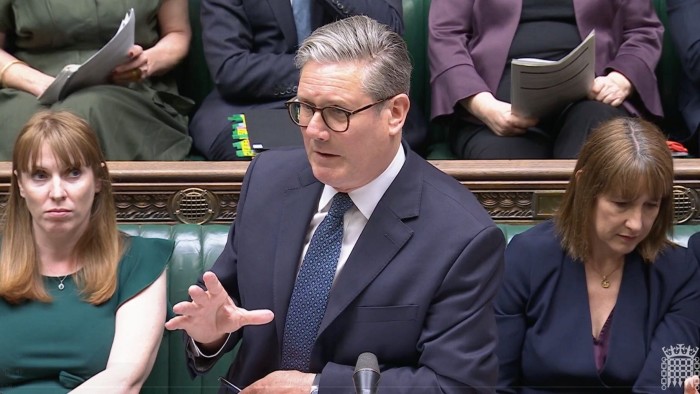Unlock the Editor’s Digest for free
Roula Khalaf, Editor of the FT, selects her favourite stories in this weekly newsletter.
Sir Keir Starmer was forced to defend the UK government’s pursuit of “net zero” carbon emissions on Wednesday after criticism of the policy from former Labour prime minister Sir Tony Blair.
Blair warned in a report published by his think-tank on Tuesday that there needed to be a reset of the “irrational” debate over net zero policies. In his foreword to the Tony Blair Institute report, he argued that attempts to phase out fossil fuels in the short term were “doomed to fail” given the growing demand for oil, gas and coal around the world.
Blair had added that voters were being asked to make “financial sacrifices and changes in lifestyle” that would have a “minimal” effect on global emissions, and said a public backlash could “derail the whole agenda”.
The report suggested that policymakers should instead pursue technological solutions such as carbon capture and storage.
During Prime Minister’s Questions on Wednesday, Sammy Wilson, a DUP MP, blamed net zero policies for thousands of jobs being lost in Scotland, as well as higher business costs and blackouts in Spain.
“Does he not recognise that his own net zero policy is not only bad, but it’s mad, and indeed his own former leader is now accepting this?” he said in the House of Commons.
Starmer replied that the government was already carrying out many of the measures recommended by Blair, such as investments in carbon capture and greater use of artificial intelligence. “If you look at the detail of what Tony Blair said it’s actually aligned with what we are doing here, these are the jobs and the security of the future.”
The prime minister also urged MPs not to “weaponise the difficult position” facing people in Spain.
Spanish officials and engineers are still trying to work out why there was a catastrophic failure of the electricity supply on Monday, which has raised pressing questions about the resilience of grid infrastructure across Europe as governments race to decarbonise their power systems.
The intervention by Blair, who was UK prime minister for a decade until 2007, represents the latest sign of fragmentation of the political consensus on how to tackle climate change.
Tory leader Kemi Badenoch argued in March that cutting the UK’s net carbon emissions to zero by 2050 was an “impossible” task, and the goal could not be achieved “without a serious drop in our living standards or by bankrupting us”.

One Labour figure described Blair’s intervention as a “really unhelpful . . . temper tantrum”, and it prompted fury inside Ed Miliband’s energy department (DESNZ).
“As the prime minister said last week, the clean energy mission is in the DNA of this government because it is the route to energy security, lower bills and good jobs for our country,” said DESNZ.
Critics pointed out that Blair’s clients had included the government of Saudi Arabia, one of the biggest fossil fuel producers in the world.
Carla Denyer, co-leader of the Green party, said: “Tony Blair has decided to mimic Nigel Farage on net zero and sounds like he is speaking on behalf of petro states like Saudi Arabia and Kazakhstan for whom he has lobbied for more years than he was prime minister.”
The TBI tried to mollify the government on Wednesday by saying ministers’ approach to carbon capture, new nuclear and smart grids was “the right one”.
“The report is clear that we support the government’s 2050 net zero targets, to give certainty to the investors and innovators who can develop these new solutions and make them deployable,” the think-tank said.

The prime minister’s spokesperson said that Starmer welcomed the TBI “backing the government’s approach”.
The TBI lists the UK Foreign, Commonwealth and Development Office as one of its key “donors and funding partners” in its latest set of accounts.
Dale Vince, the green energy entrepreneur who gave Labour more than £5mn for its election campaign last year, described Blair’s argument as “nonsense”.
“He says we need less focus on renewable energy and more on carbon capture — one is cheap and abundant and prevents carbon emissions, the other is an incredibly expensive way of trying to deal with emissions,” he said. “Prevention — green energy — is always better and cheaper than the cure. Net zero is in fact the economic opportunity of the century.”




